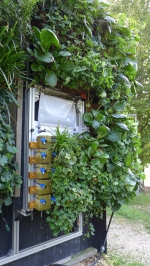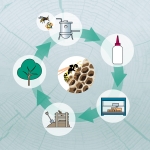Baden-Württemberg and its companies
Bioeconomy refers to the sustainable management of renewable natural resources, which is why there is no such thing as a bioeconomy industry in the traditional sense. However, there are companies in Baden-Württemberg that use biomass as raw material base and have already developed products and processes in their effort to act more sustainably
The energy producer badenova uses male corn plants to produce renewable natural gas (RNG). The company circumvents the food vs fuel conflict as the male plants are only used to pollinate female corn before being discarded. A company called TECNARO from Ilsfeld/Auenstein near Heilbronn has developed a technology that it uses to produce injection-mouldable plastics and fibrous materials from lignin. These materials are already being used in numerous products. The company fischerwerke has developed a wall plug that is partially produced from renewable resources. The wall plug is produced from two-component nylon, and one of the two components is produced from castor oil. Daimler AG's A-Class is equipped with an engine cover that is also produced with a plastic partially made from biological resources.
Companies not only face challenges relating to products, but also concerning innovative production processes. New methods and machines need to be developed in order to be able to use biomass sustainably on an industrial scale. This means that traditional sectors such as the mechanical engineering and plant construction sectors must be made aware and persuaded of the necessity and benefits of the bioeconomy.
Company profiles
-
Facade greening with precipitation retention - 19/12/2023

Due to dense urbanisation and associated soil sealing, heat and heavy rainfall are becoming an increasing problem for people living in cities. Researchers at the German Institutes of Textile and Fibre Research (DITF) in Denkendorf have developed innovative living walls that not only help cool the environment, but also provide flood protection thanks to their water retention properties.
-
Sustainable binder alternative - 18/12/2023

Plastic is all around us; and unfortunately, it is not going away any time soon. The search for more sustainable solutions is fully underway. However, binders that degrade only with difficulty or not at all are still used to bond natural materials such as wood and straw - not yet truly environmentally friendly. Fraunhofer researchers are working on an insect-inspired wood binder that makes bonded wood products both resistant and biodegradable.
Company foundations in the bioeconomy field
-
Facade greening with precipitation retention - 19/12/2023

Due to dense urbanisation and associated soil sealing, heat and heavy rainfall are becoming an increasing problem for people living in cities. Researchers at the German Institutes of Textile and Fibre Research (DITF) in Denkendorf have developed innovative living walls that not only help cool the environment, but also provide flood protection thanks to their water retention properties.
-
Sustainable binder alternative - 18/12/2023

Plastic is all around us; and unfortunately, it is not going away any time soon. The search for more sustainable solutions is fully underway. However, binders that degrade only with difficulty or not at all are still used to bond natural materials such as wood and straw - not yet truly environmentally friendly. Fraunhofer researchers are working on an insect-inspired wood binder that makes bonded wood products both resistant and biodegradable.
News of bioeconomic companies
-
Press release - 11/10/2023
Doubling food production, saving water, and increasing carbon storage capacity – this may sound paradoxical, but would be theoretically feasible. Reaching this goal, however, would require a radical spatial reorganization of land use. This is the conclusion of researchers from Karlsruhe Institute of Technology (KIT) and the Heidelberg Institute for Geoinformation Technology (HeiGIT) of Heidelberg University.
-
Press release - 09/10/2023
Researchers at the University of Hohenheim are working on an alternative to fish consisting of microalgae. Advantage: Microalgae have high quality ingredients and also contribute to carbon storage.
Website address: https://www.biooekonomie-bw.de/en/bw/stakeholders/companies

